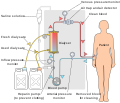Kidney dialysis
Kidney dialysis is a medical procedure that substitutes the natural function of the kidneys when they are failing or have failed. This treatment is essential for individuals suffering from chronic kidney disease (CKD) or acute kidney injury (AKI), particularly when they reach the advanced stages known as end-stage renal disease (ESRD). Dialysis works by removing waste products, excess fluid, and salts from the blood, thereby helping to regulate blood pressure and maintain the balance of essential minerals such as potassium and sodium in the body.
Types of Kidney Dialysis[edit]
There are two main types of kidney dialysis: Hemodialysis and Peritoneal dialysis.
Hemodialysis[edit]
In hemodialysis, blood is filtered through a dialyzer, also known as an artificial kidney, outside the body. The process involves circulating the patient's blood through the machine, where it is cleaned before being returned to the body. This type of dialysis is typically performed three times a week, each session lasting around four hours, in a dialysis center or hospital. However, with the advent of portable machines, home hemodialysis is becoming an increasingly viable option.
Peritoneal Dialysis[edit]
Peritoneal dialysis utilizes the lining of the abdomen, or peritoneum, as a natural filter. A dialysis solution is introduced into the abdominal cavity through a catheter, where it absorbs waste products and excess fluids from the blood vessels in the peritoneal membrane. The solution is then drained and discarded. This type of dialysis can be performed at home, often overnight, making it a more flexible option for many patients.
Indications for Dialysis[edit]
Dialysis is recommended when a patient's kidneys can no longer perform their function well enough to keep the patient healthy. This situation is typically determined by a significant decline in the glomerular filtration rate (GFR), elevated levels of waste products such as urea and creatinine in the blood, or the occurrence of symptoms of severe kidney failure, which may include nausea, vomiting, fatigue, and swelling due to fluid retention.
Risks and Complications[edit]
While dialysis is a life-saving treatment, it is not without risks and complications. These may include infection, blood clots, low blood pressure, and the long-term complication of dialysis-related amyloidosis. Patients undergoing dialysis may also experience a decrease in quality of life due to the time-consuming nature of the treatment and its side effects.
Living with Dialysis[edit]
Adjusting to life on dialysis can be challenging for patients and their families. It requires significant lifestyle changes, including dietary restrictions, fluid intake limitations, and regular scheduling of dialysis sessions. Support from healthcare professionals, as well as from friends and family, is crucial in managing the physical and emotional challenges that come with this treatment.
Future Directions[edit]
Research is ongoing to improve dialysis technology and to find new treatments for kidney failure. This includes the development of more efficient and less invasive dialysis machines, as well as efforts to create a bioartificial kidney that could one day eliminate the need for dialysis.
-
Semipermeable membrane diagram
-
Hemodialysis machine
-
Osmosis, Diffusion, Ultrafiltration, and Dialysis
-
Hemodialysis process
-
Peritoneal dialysis
-
Continuous Venovenous Hemofiltration (CVVH)
-
Continuous Venovenous Hemodiafiltration (CVVHDF)
-
Dialysis access in arm
Ad. Transform your life with W8MD's Budget GLP-1 injections from $75


W8MD offers a medical weight loss program to lose weight in Philadelphia. Our physician-supervised medical weight loss provides:
- Weight loss injections in NYC (generic and brand names):
- Zepbound / Mounjaro, Wegovy / Ozempic, Saxenda
- Most insurances accepted or discounted self-pay rates. We will obtain insurance prior authorizations if needed.
- Generic GLP1 weight loss injections from $75 for the starting dose.
- Also offer prescription weight loss medications including Phentermine, Qsymia, Diethylpropion, Contrave etc.
NYC weight loss doctor appointmentsNYC weight loss doctor appointments
Start your NYC weight loss journey today at our NYC medical weight loss and Philadelphia medical weight loss clinics.
- Call 718-946-5500 to lose weight in NYC or for medical weight loss in Philadelphia 215-676-2334.
- Tags:NYC medical weight loss, Philadelphia lose weight Zepbound NYC, Budget GLP1 weight loss injections, Wegovy Philadelphia, Wegovy NYC, Philadelphia medical weight loss, Brookly weight loss and Wegovy NYC
|
WikiMD's Wellness Encyclopedia |
| Let Food Be Thy Medicine Medicine Thy Food - Hippocrates |
Medical Disclaimer: WikiMD is not a substitute for professional medical advice. The information on WikiMD is provided as an information resource only, may be incorrect, outdated or misleading, and is not to be used or relied on for any diagnostic or treatment purposes. Please consult your health care provider before making any healthcare decisions or for guidance about a specific medical condition. WikiMD expressly disclaims responsibility, and shall have no liability, for any damages, loss, injury, or liability whatsoever suffered as a result of your reliance on the information contained in this site. By visiting this site you agree to the foregoing terms and conditions, which may from time to time be changed or supplemented by WikiMD. If you do not agree to the foregoing terms and conditions, you should not enter or use this site. See full disclaimer.
Credits:Most images are courtesy of Wikimedia commons, and templates, categories Wikipedia, licensed under CC BY SA or similar.
Translate this page: - East Asian
中文,
日本,
한국어,
South Asian
हिन्दी,
தமிழ்,
తెలుగు,
Urdu,
ಕನ್ನಡ,
Southeast Asian
Indonesian,
Vietnamese,
Thai,
မြန်မာဘာသာ,
বাংলা
European
español,
Deutsch,
français,
Greek,
português do Brasil,
polski,
română,
русский,
Nederlands,
norsk,
svenska,
suomi,
Italian
Middle Eastern & African
عربى,
Turkish,
Persian,
Hebrew,
Afrikaans,
isiZulu,
Kiswahili,
Other
Bulgarian,
Hungarian,
Czech,
Swedish,
മലയാളം,
मराठी,
ਪੰਜਾਬੀ,
ગુજરાતી,
Portuguese,
Ukrainian








